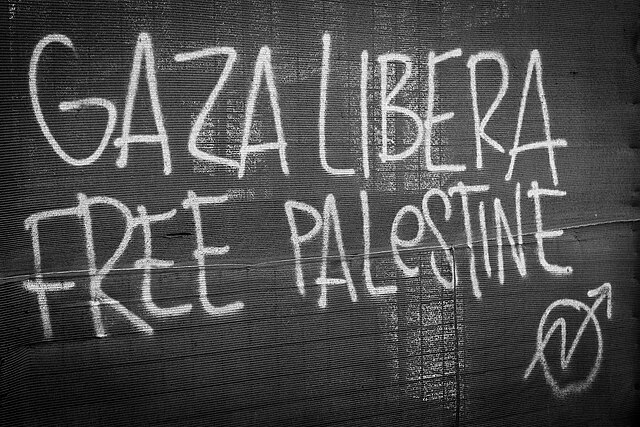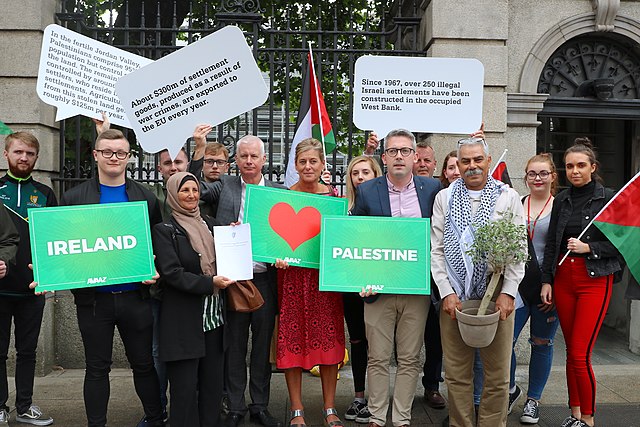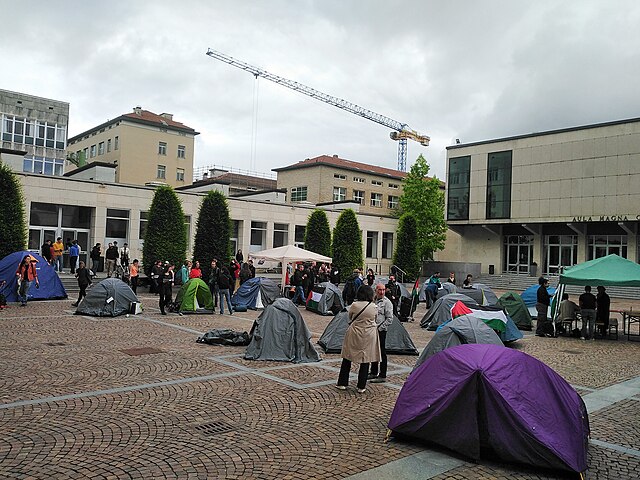Italian Protests Over Italy’s Silence on Gaza

By: Fayzeh Abou Ardat / Arab America contributing writer
June 7, 2025, marked a significant day for Italians, activists, and particularly for the global Palestinian solidarity movement. Approximately 300,000 individuals protested in Rome, demanding Italian Prime Minister Giorgia Meloni address human rights violations in Gaza. Fayzeh Abou Ardat, Arab America contributing writer, reports on the growing momentum of Italy’s pro-Palestine movement and its implications.
The event was organized by opposition parties, including the Democratic Party, the Five Star Movement, and the Greens and Left Alliance. The demonstration was in response to the silence of the governing party, Brothers of Italy, regarding the illegal humanitarian blockade imposed by Israel.
This lack of response is unsurprising given Meloni’s strong ties with the United States and the government’s immigration policies. These policies have drawn criticism for violating humanitarian rights, particularly toward North African individuals due to Italy’s geographic proximity.
Far-right, post-fascist roots shape Meloni’s administration and have maintained a cautious stance on the war. Consistently affirming Israel’s right to self-defence while vaguely acknowledging the need to protect civilians.
Since 2023, Meloni has issued statements that address both sides, though these have arguably leaned in favour of Israel. During the intergovernmental summit with Greek Prime Minister Mitsotakis on May 21, 2025, Meloni made a brief remark about the conflict. Meloni briefly referenced humanitarian aid in Gaza and called for an end to hostilities but did not elaborate.
The growing unrest among the Italian population reflects the frustration over the government’s ambiguous stance. Protesters are demanding stronger condemnation of Israeli actions and an active push for humanitarian aid access in Gaza. This demand sits at the heart of Italians advocating for moral and political clarity.
Italy, alongside France and Germany, has maintained a public diplomatic stance regarding the war. In contrast, countries such as Ireland, Spain, and Belgium have openly called for a humanitarian ceasefire. They emphasize that Israel’s right to self-defence does not justify targeting civilians.

While Italy, France, and Germany have seen a rise in far-right populist parties, national protests indicate otherwise. The views of civilians do not necessarily align with those of their governments. Across these countries, large-scale demonstrations continue to pressure governments to act on behalf of Palestinians.
The June 7 demonstration was one of the largest in recent history, though not the first. Since the war’s outbreak in 2023, Rome has hosted major protests. These include those on May 17, October 5, and November 30, 2024, all of which have showcased strong civil solidarity for Gaza. One notable action was the May 28, 2024, occupation of Bologna Train Station, a demonstration that led to travel disruptions.
Italian university students have also been at the forefront of activism. In cities such as Rome, Milan, Palermo, and Florence, students have organized campus encampments demanding that their institutions cut ties with Israeli universities.

In 2024, Milanese students led a 10-day protest calling for an end to the Italian Ministry of Education’s cooperation with Israel. These actions have followed similar protests in Turin and Rome, focusing on terminating the scientific, industrial, and technological (STI) bilateral cooperation agreement. This agreement promotes collaboration on innovation projects between Israeli and Italian institutions.
Italy serves as an example of a Western European nation where a far-right government is in power, yet the right to protest remains vibrant. Italian demonstrations reflect international solidarity with Palestine and underscore how civilian movements can influence discourse, even when political leadership fails to act decisively.
Want more articles like this? Sign up for our e-newsletter!
Check our blog here!








